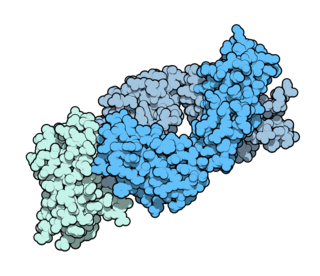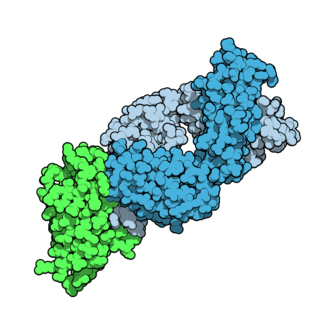Related Research Articles

Targeted therapy or molecularly targeted therapy is one of the major modalities of medical treatment (pharmacotherapy) for cancer, others being hormonal therapy and cytotoxic chemotherapy. As a form of molecular medicine, targeted therapy blocks the growth of cancer cells by interfering with specific targeted molecules needed for carcinogenesis and tumor growth, rather than by simply interfering with all rapidly dividing cells. Because most agents for targeted therapy are biopharmaceuticals, the term biologic therapy is sometimes synonymous with targeted therapy when used in the context of cancer therapy. However, the modalities can be combined; antibody-drug conjugates combine biologic and cytotoxic mechanisms into one targeted therapy.

Ipilimumab, sold under the brand name Yervoy, is a monoclonal antibody medication that works to activate the immune system by targeting CTLA-4, a protein receptor that downregulates the immune system.

Tremelimumab is a fully human monoclonal antibody against CTLA-4. It is an immune checkpoint blocker. Previously in development by Pfizer, it is now in investigation by MedImmune, a wholly owned subsidiary of AstraZeneca. It has been undergoing human trials for the treatment of various cancers but has not attained approval for any.
Mitumomab (BEC-2) is a mouse anti-BEC-2 monoclonal antibody investigated for the treatment of small cell lung carcinoma in combination with BCG vaccination. Mitumomab attacks tumour cells, while the vaccine is thought to activate the immune system. It was developed by ImClone and Merck.

Cediranib is a potent inhibitor of vascular endothelial growth factor (VEGF) receptor tyrosine kinases.

Tumor-infiltrating lymphocytes are white blood cells that have left the bloodstream and migrated towards a tumor. They include T cells and B cells and are part of the larger category of ‘tumor-infiltrating immune cells’ which consist of both mononuclear and polymorphonuclear immune cells, in variable proportions. Their abundance varies with tumor type and stage and in some cases relates to disease prognosis
Targeted therapy of lung cancer refers to using agents specifically designed to selectively target molecular pathways responsible for, or that substantially drive, the malignant phenotype of lung cancer cells, and as a consequence of this (relative) selectivity, cause fewer toxic effects on normal cells.

Motesanib is an experimental drug candidate originally developed by Amgen but later investigated by the Takeda Pharmaceutical Company. It is an orally administered small molecule belonging to angiokinase inhibitor class which acts as an antagonist of VEGF receptors, platelet-derived growth factor receptors, and stem cell factor receptors. It is used as the phosphate salt motesanib diphosphate. After clinical trials in thyroid cancer, non-small cell lung cancer, gastrointestinal stromal cancer, colorectal cancer, and breast cancer, the drug was not found to show sufficient efficacy for further development, and development was abandoned by Takeda.

Nivolumab, sold under the brand name Opdivo, is a medication used to treat a number of types of cancer. This includes melanoma, lung cancer, malignant pleural mesothelioma, renal cell carcinoma, Hodgkin lymphoma, head and neck cancer, urothelial carcinoma, colon cancer, esophageal squamous cell carcinoma, liver cancer, gastric cancer, and esophageal or gastroesophageal junction (GEJ) cancer. It is used by slow injection into a vein.
A MEK inhibitor is a chemical or drug that inhibits the mitogen-activated protein kinase kinase enzymes MEK1 and/or MEK2. They can be used to affect the MAPK/ERK pathway which is often overactive in some cancers.

Dabrafenib, sold under the brand name Tafinlar & Rafinlar among others, is a medication for the treatment of cancers associated with a mutated version of the gene BRAF. Dabrafenib acts as an inhibitor of the associated enzyme B-Raf, which plays a role in the regulation of cell growth. Dabrafenib has clinical activity with a manageable safety profile in clinical trials of phase 1 and 2 in patients with BRAF (V600)-mutated metastatic melanoma.

Pembrolizumab, sold under the brand name Keytruda, is a humanized antibody used in cancer immunotherapy that treats melanoma, lung cancer, head and neck cancer, Hodgkin lymphoma, stomach cancer, cervical cancer, and certain types of breast cancer. It is given by slow injection into a vein.
Viralytics Ltd is an Australian biotechnology company working in the field of oncolytic viruses, that is, viruses that preferentially infect and kill cancer cells. The company's oncolytic virus product, called Cavatak, is currently in clinical trials in metastatic melanoma and other cancers. The drug was granted Orphan Drug status in advanced melanoma in December 2005.

J. William Harbour, M.D., is an American ophthalmologist, ocular oncologist and cancer researcher. He is currently Chair of the Department of Ophthalmology at the University of Texas Southwestern Medical Center in Dallas. He previously served as the vice chair and director of ocular oncology at the Bascom Palmer Eye Institute and associate director for basic science at the Sylvester Comprehensive Cancer Center of the University of Miami's Miller School of Medicine.

Caroline Dive is a British cancer research scientist. Dive is Professor of Cancer Pharmacology at the University of Manchester, Deputy Director of the Cancer Research UK (CRUK) Manchester Institute, Director of the CRUK Manchester Institute Cancer Biomarker Centre and co-director of the CRUK Lung Cancer Centre of Excellence. She is the current President of The European Association for Cancer Research (EACR).

Sarah Coupland is an Australian-born pathologist and professor who is the George Holt Chair in Pathology at the University of Liverpool. Coupland is an active clinical scientist whose research focuses on the molecular genetics of cancers, with particular interests in uveal melanoma, conjunctival melanoma, intraocular and ocular adnexal lymphomas and CNS lymphoma. Coupland is also an NHS Honorary Consultant Histopathologist at the Royal Liverpool University Hospital. Since 2006, Coupland has been head of the Liverpool Ocular Oncology Research Group; from which she runs a multidisciplinary oncology research group focussing on Uveal melanoma, based in the Department of Molecular and Clinical Cancer Medicine at the University of Liverpool. Her research laboratory is currently located in the Institute of Translational Medicine From April 2014 to December 2019, Coupland was also Director of the North West Cancer Research Centre, @UoL. In both 2019 and 2020, Coupland was included on the 'Pathology Powerlist' on The Pathologist website.

Indisulam is a chloroindolyl sulfonamide cell cycle inhibitor that exhibits antitumor activity in vitro and in an animal model. This compound affects cell cycle progression in human tumor cells and is being studied for the treatment of cancers such as melanomas and blood-borne cancers such as leukemia.
Taofeek Kunle Owonikoko is an American physician who is Professor and Vice-Chair for Faculty Development, Department of Haematology and Medical Oncology at the Winship Cancer Institute. His research considers small cell lung cancer. He was a 2019 Emory University Woodruff Leadership Academy Fellow.
Roy S. Herbst is an American oncologist who is the Ensign Professor of Medicine, Professor of Pharmacology, Chief of Medical Oncology, and Associate Director for Translational Research at Yale Cancer Center and Yale School of Medicine in New Haven, Connecticut.

Bisantrene, trademarked as Zantrene, is an anthracenyl bishydrazone with anthracycline-like antineoplastic activity. Bisantrene intercalates with and disrupts the configuration of DNA, resulting in DNA single-strand breaks, DNA-protein crosslinking, and inhibition of DNA replication. This agent is similar to doxorubicin in activity, but unlike anthracyclines like doxorubicin, exhibits little cardiotoxicity.
References
- ↑ Times Online, Jul 2, 2009
- ↑ Journal of Clinical Oncology, Vol 24, No 31 (November 1), 2006: pp. 5034-5042 --cited 429 times according to Google Scholar
- ↑ British Library Catalog
- ↑ "Google Scholar".